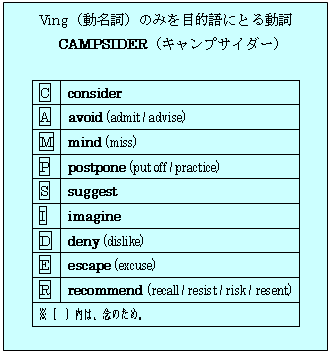Tom is considering changing his major.
 ■
■
We finished eating at 7:00.
 ■
■
I dislike being alone.</p></SPAN>
 ■
■
He admitted having stolen the money.
 ■
■
Don't put off answering the letter.
 ■
■
He postponed sending an answer to the request.
 ■
■
I can't understand his deceiving his friend.
 ■
■
Why have they delayed opening the new school?
 ■
■
■The little girl stopped crying.
 ■
■
■He denied knowing anything about the plan.
彼はその計画について何も知らないと言った。
■He resented being laughed at.
彼は笑われたことに腹を立てた。
■He narrowly missed being killed.
彼はかろうじて死を免れた。
■I couldn't resist laughing at the sight.
私はその光景を見て笑わずにはいられなかった。
■I don't allow smoking. I don't allow him to smoke.
私はタバコを吸うことを許さない。 彼がタバコを吸うことを許さない。
■Please excuse my being late.
おそくなってごめんなさい。
■She regretted beating his daughter.
彼女は娘をたたいたことを後悔した。
■They discussed moving to London.
彼らはロンドンへ引っ越すことを話し合った。
■They practiced wrestling.
彼らはすもうのけいこをした。
■Try to avoid travelling in the rush hours.
ラッシュ時に電車に乗るのは避けるようにしなさい。
■Would you mind putting the light on? It's getting very dark.
電灯をつけてくれませんか? とても暗くなってきています。
■You can hardly escape being seen if you go out now.
いま出て行ったら、人目につかないというわけにはいきません。
■Fancy having to get up at 5 every morning!
毎朝5時に起きなければならないなんてことを、まあ想像してごらん。
■He often defers making a decision.
 ■
■
b_secretプラグインは存在しません。
defer (1)
"delay," c.1375, from O.Fr. differer, from L. differre "set apart, put off, delay," also "be different, differ," from dis- "apart" + ferre "carry" (see infer). Etymologically identical with differ; the spelling and pronunciation differentiated from 15c., partly by association of this word with delay.
}}■You mustn't postpone answering this letter.
 ■
■

abandon,
abhor,
abolish,
abominate,
accept,
accompany,
admire,
admit, (認める)
adore,
- advise,
advocate,
- allow,
anticipate,
appreciate,
attend,
attribute,
avoid, (避ける)
back,
ban,
bar,
begrudge,
break off,
cannot help, (〜せずにはおれない)
celebrate,
cherish,
commemorate,
commend,
compare,
complete,
conceal,
condone,
connote,
contemplate,
countenance,
criticize,
curse,
cut out,
debate,
defend,
defer,
delay,
denote,
deny, (否定する)
deplore,
deprecate,
despair,
despise,
detest,
disclaim,
discontinue,
discountenance,
discuss,
disguise,
dislike,
dispute,
disregard,
dodge,
drop,
eliminate,
emphasize,
end,
endanger,
endorese,
enjoy, (楽しむ)
ensure,
entail,
envisage(= to picture in the mind as a future possibility; imagine),
envy, grudge,
escape, (免れる)
excuse, (許す)
explain,
face,
facilitate,
fancy, (想像する)
favour,
finish, (終える)
foreshadow,
forfeit,
forgive,
forsee,
forswear,
funk =(avoid because of fear),
give over,
give up, (やめる)
glorify,
ignore,
imitate,
impede,
imply,
include,
intimate,
involve,
justify,
knock off,
lay off,
legitimize,
loathe,
mention,
mind, (いやがる)
miss,
necessitate,
obviate,
oppose,
organize,
overlook,
overprize,
overrule,
overshadow,
pardon,
picture,
postpone=put off, (延期する)
practice, (練習する)
praise,
precipitate,
preclude,
predict,
prescribe,
prevent,
prize,
prohibit,
query,
question,
quit,
recall,
recollect,
record,
recount,
rectify,
register,
reject,
relish,
repent,
repent,
report,
report,
represent,
represent,
resent,
resist,
resume,
resume,
ridicule,
ridicule,
risk,
risk,
rule out,
sacrifice,
sacrifice,
sanction,
save,
shirk,
shun,
signify,
simulate,
skip,
spoil,
square,
stand,
stop=quit=leave off, (やめる)
stress,
study,
substantiate,
suggest,
support,
survive,
tolerate,
treat,
undervalue,
value,
veto,
view,
visualize,
welcome (= receive the idea of ...),
withstand,
- 印の動詞は、We do not allow playing football on the lawn. のようにすぐ後に動名詞がくる。ただし、I don't allow my children to drink alcohol. のように動詞の後に名詞句がくると不定詞をとる。
――現代英文法総論(レナート・デクラーク・著 安井稔・訳 開拓社)を参考にしました。









